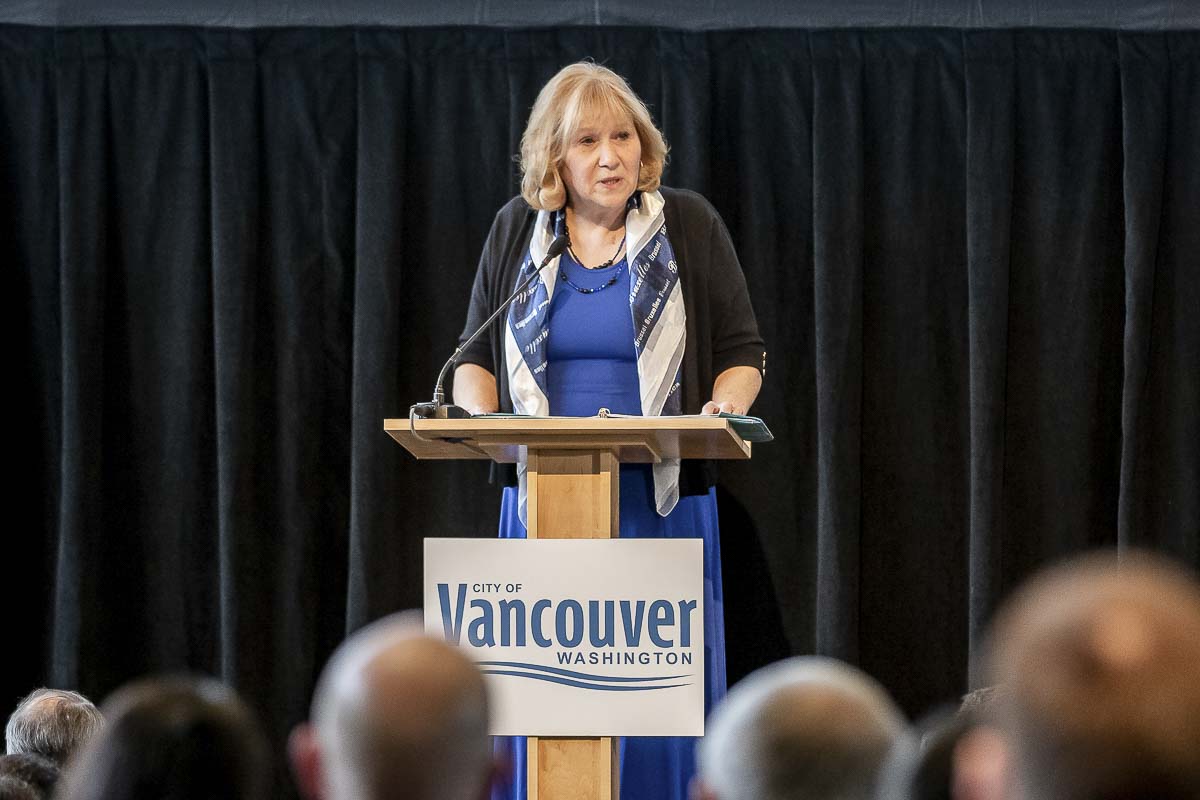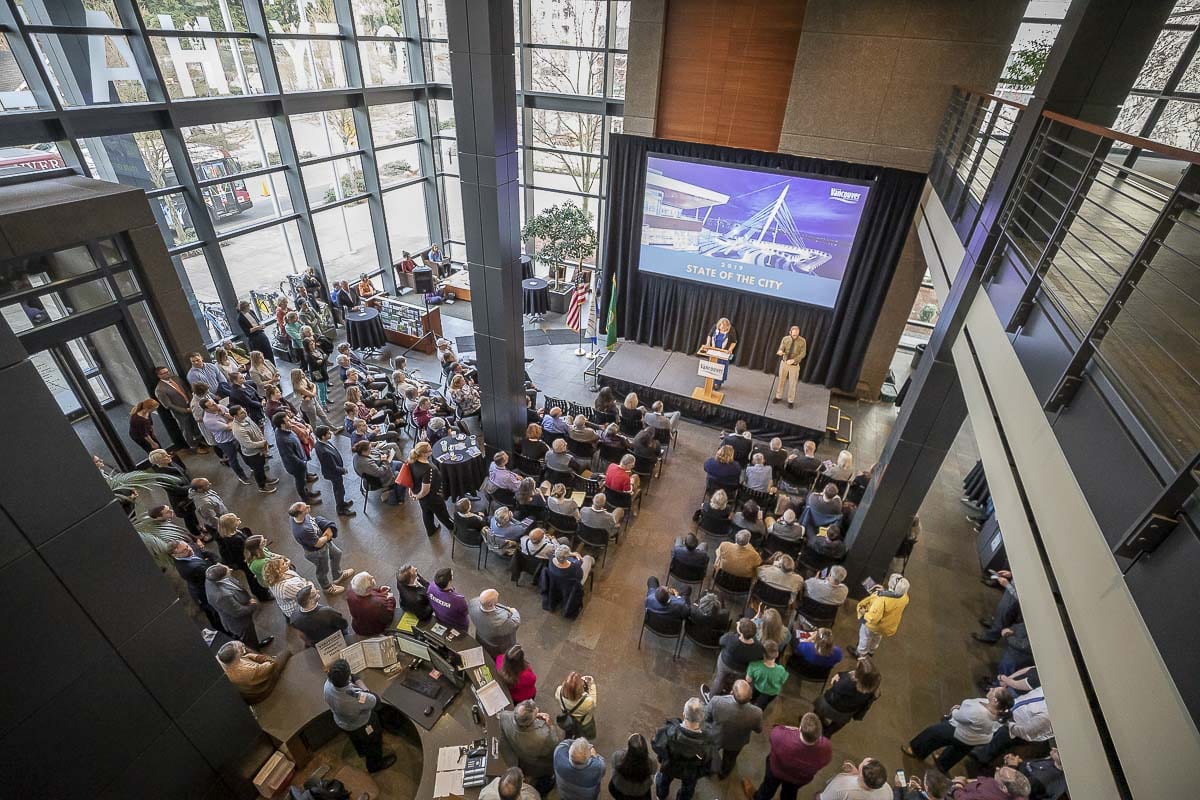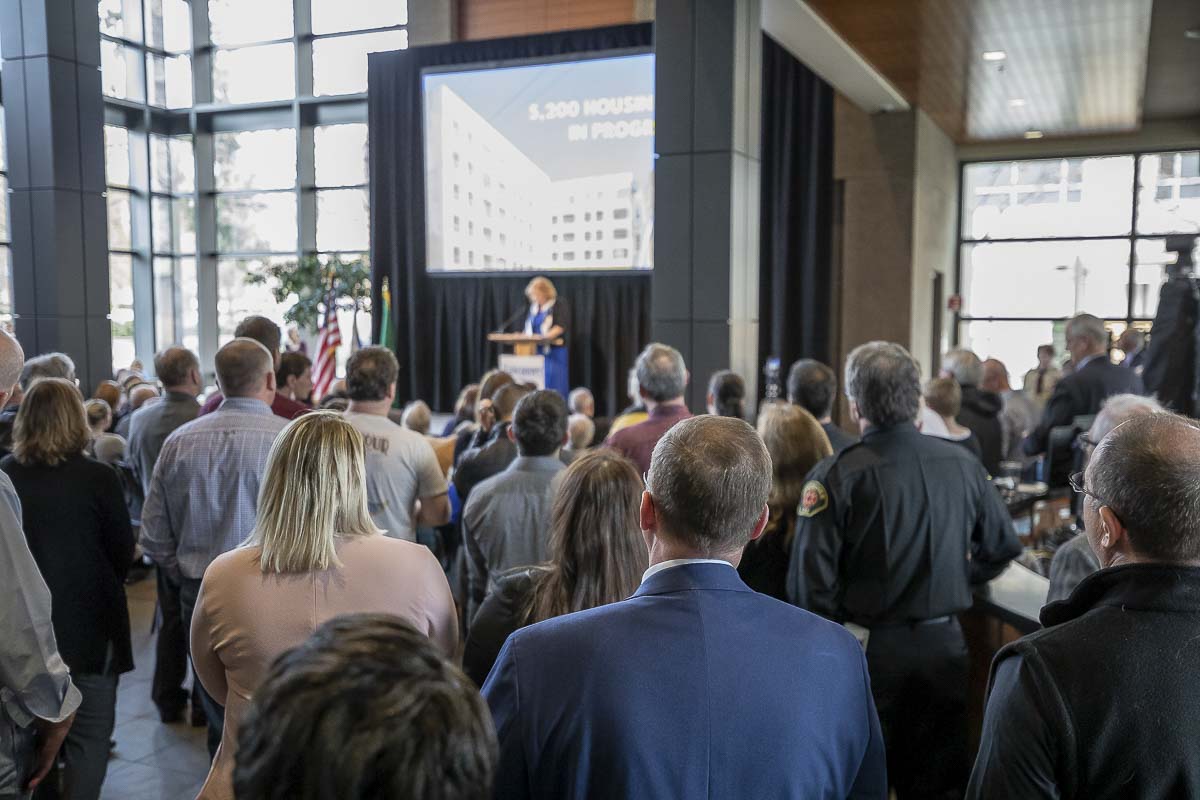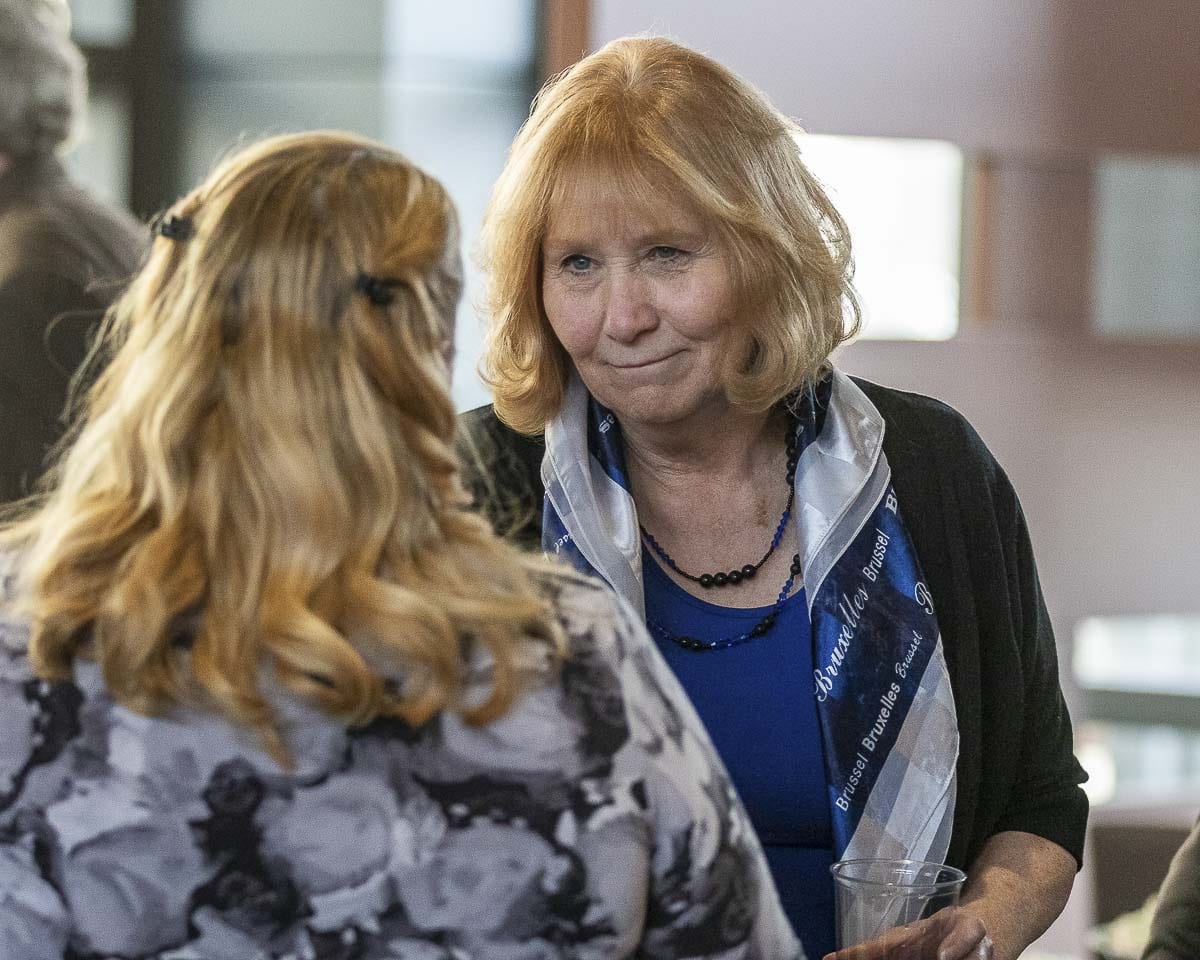Mayor Anne McEnerny-Ogle says homelessness and lack of funding remain the city’s biggest challenges
VANCOUVER — In her second State of the City address, Vancouver Mayor Anne McEnerny-Ogle outlined a long list of progress being made in Washington state’s 2nd-fastest growing city, and a whole lot of grim challenges also looming.

McEnerny-Ogle highlighted the grand opening of the city’s new Waterfront Park, a crown jewel tourist attraction that will soon be home to a number of new restaurants, retail shops, office space, condos, apartments, and hotel space. This year the city will begin work on the Waterfront Gateway Master Plan, which will eventually lead to major redevelopment of several city-owned pieces of property around City Hall near Esther Short Park.
Progress is also being made on several major projects, including Section 30, which will bring new homes, jobs, and retail space to a former rock quarry on the east side of the city. The city also recently purchased 45 acres of undeveloped land in the northeast part of town that will eventually house a public park and other mixed-use development.
“The variety of resources at this location, as well as the adjoining school property, offers multiple prospects for future grants and projects to benefit our community,” said the mayor.
Vancouver is also moving ahead with plans to redevelop the former Tower Mall site, now known as Tower Plaza, along Mill Plain. The city purchased 12 acres and has put together a redevelopment plan that will be outlined next month for the public to provide feedback on.
That development is expected to be a major cog in the long term plan for Mill Plain, which could see 13,000 new jobs and over 6,000 housing units by 2040. That potential growth is also why the city has thrown its support behind C-TRAN in their plan to make Mill Plain the next major street for The Vine Bus Rapid Transit.
“We will be the poster child for the FTA (Federal Transit Authority) because we’re making it happen in the shortest amount of time,” said McEnerny-Ogle.
The rapid growth of Vancouver, McEnerny-Ogle said, represents both opportunity and challenge. Yearly population growth since the end of the recession has averaged 3,500 people, bringing the current population within the city limits to more than 185,000.
“In the past eight years the diversified economy in Clark County, which is built on healthcare, manufacturing, food processing and trade, has added 37,000 new jobs and over 1,300 new businesses,” the mayor told the crowd gathered inside City Hall. “And, in fact, that job growth has outpaced the Portland Metro area, Washington State, and the United States since recovery.”

On that point, McEnerny-Ogle took time to welcome Vigor Industrial, which recently announced it will be moving into the former Christensen Yachts building on Columbia Boulevard where they’ll be building a new landing craft for the U.S. Army. Vigor anticipates hiring 400 engineers, designers, welders, and more at full build out.
“We have all the ingredients we need here in our attractive, vibrant city to continue strengthening our economy, attract private investment and bring in new businesses and jobs,” said the mayor.
But a growing population also means a growing challenge in how to provide services. McEnerny-Ogle noted that half of the open space owned by the city is undeveloped, leaving Vancouver far behind other similar-sized cities when it comes to parks and community spaces. The majority of the city’s critical infrastructure, including fire and police stations, she said, would likely not survive even a moderate earthquake.
“Though the city has remained committed to the culture of continuous improvement and fiscal discipline, the city’s cost structure is projected to outpace revenues in the early half of the next decade,” said McEnerny-Ogle.
She cast the blame on a pattern of tax repeal in the late 90’s, a statewide initiative that reformed how local governments are funded, multiple recessions, and a tightening of the state budget in addition to our rapid population growth.
“These compounding revenue issues have resulted in substantial capital and operating deficits within the city,” said McEnerny-Ogle. “And what this means is that we have fewer resources to serve more people.”
A two-year process by the Executive Sponsors Council, which includes former mayor Tim Leavitt, to explore service levels and potential funding options is expected to culminate in a report to Vancouver City Council on April 15.
“Tax day,” joked McEnerny-Ogle.

That report will be followed by a long process of public input, which has already included several surveys as the city tries to understand which services people see as most important.
“A stronger Vancouver is about a stronger city. It’s about a city that prospers and thrives, a city with high-quality parks, safe roads, vibrant public spaces, and jobs and amenities that our residents want,” said the mayor. “And, most importantly, a city that provides equitable opportunities for all to succeed. We need to hear your voices. We need you to make this city great.”
Housing and homelessness
Homelessness also continues to be a growing problem, with the unsheltered population having grown 80 percent in Clark County since 2015.
“These are issues being experienced by cities across the country,” said the mayor.
The city began addressing the issue two years ago with the voter-approved Affordable Housing Fund, which provides six million dollars annually to help with buying buildings or constructing new affordable housing, along with rental assistance programs to try and prevent people falling into homelessness.
McEnerny-Ogle said the first affordable housing development funded by the tax opened last year, with an additional 500 units potentially in the pipeline from the next round of grants. An additional 200 people were allowed to stay in their homes last year due to rental assistance programs.
The city has seen a burst in new housing growth recently. McEnerny-Ogle said the city issued 10,000 new building permits last year, a ten percent increase over the year before.
“Currently we have over 5,200 units in various stages of the development pipeline, from pre-application to construction,” she added. “That space is for 12,000 residents, and about 600 of them are affordable units, which is the most we’ve ever seen at any one point.”
McEnerny-Ogle said the city is also moving ahead with streamlining the permitting process for new developments by making it nearly 100 percent online. That will allow developers to submit applications 24-7 “in their pajamas,” and streamline the approval process.
The recent building boom, McEnerny-Ogle noted, has begun to stabilize rental prices, after Vancouver ranked near the top in the nation with price increases over the past two years.

Complete Streets and pavement projects
The city is also moving ahead with its Complete Streets initiative through the Westside Bike Mobility project and the McLoughlin Safety project. The former has garnered plenty of public backlash as the city revealed it would lead to the removal of more than a hundred street parking spaces on Columbia Street between Mill Plain and Fourth Plain. Following that feedback, city staff recently decided to push pause and get more public feedback.
“Staff is working to develop an inclusive public outreach process,” the mayor said, “and they will be including a project stakeholder committee so if you would like to join that, give us a call.”
Under the city’s pavement management program, McEnerny-Ogle noted that 24 lane miles were repaved last year, 98 more miles preserved, and 189 ADA-compliant curb ramps were completed. An additional $11 million is expected to be invested in street improvements this year.
At the state level, the legislature approved funding to at least continue exploring options to replace the aging Interstate Bridge along I-5, a topic McEnerny-Ogle joked has been a perennial State of the City talking point nearly every year in recent memory.
“I’m encouraged and thankful for Governor (Jay) Inslee’s support for funding to reopen a project office,” she said, “and for the efforts of the Clark County legislative delegation who continue to work even today to advance a new project in a bipartisan manner.”
Despite the laundry list of challenges facing the city, from homelessness to lack of funding for basic services, McEnerny-Ogle said she’s confident that the city can find a way forward.
“Working together we will successfully meet the challenges and opportunities that come our way in 2019,” she concluded. “And working together we can reach our shared goal of fulfilling Vancouver’s tremendous potential.”




